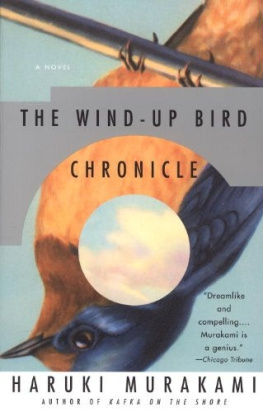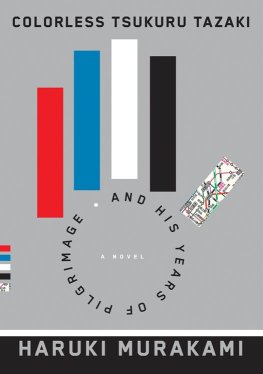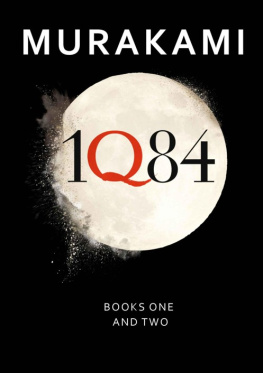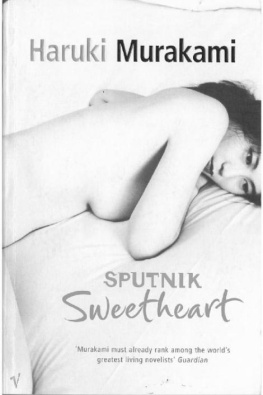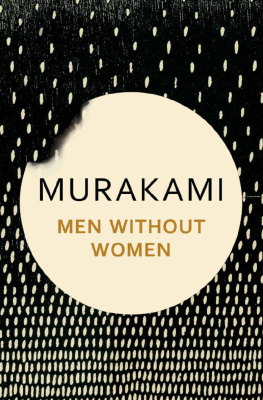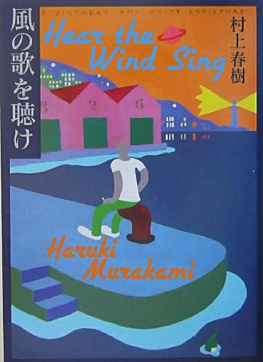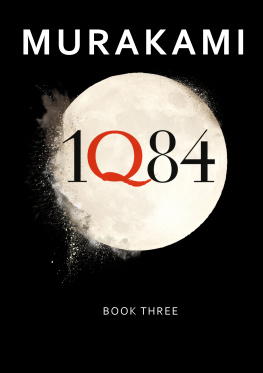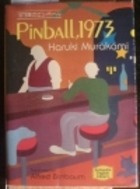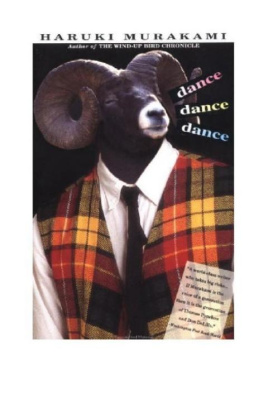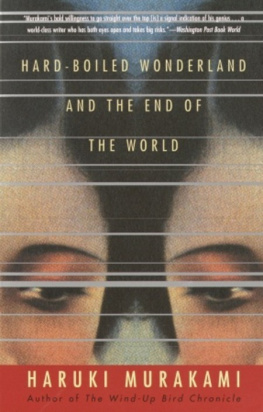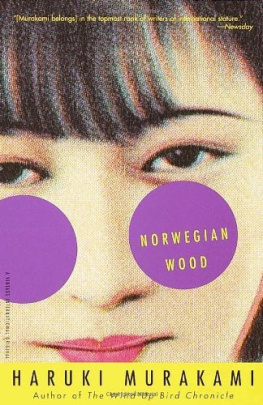Haruki Murakami - South of the Border, West of the Sun: A Novel
Here you can read online Haruki Murakami - South of the Border, West of the Sun: A Novel full text of the book (entire story) in english for free. Download pdf and epub, get meaning, cover and reviews about this ebook. year: 2000, publisher: Vintage, genre: Science fiction. Description of the work, (preface) as well as reviews are available. Best literature library LitArk.com created for fans of good reading and offers a wide selection of genres:
Romance novel
Science fiction
Adventure
Detective
Science
History
Home and family
Prose
Art
Politics
Computer
Non-fiction
Religion
Business
Children
Humor
Choose a favorite category and find really read worthwhile books. Enjoy immersion in the world of imagination, feel the emotions of the characters or learn something new for yourself, make an fascinating discovery.

- Book:South of the Border, West of the Sun: A Novel
- Author:
- Publisher:Vintage
- Genre:
- Year:2000
- Rating:5 / 5
- Favourites:Add to favourites
- Your mark:
- 100
- 1
- 2
- 3
- 4
- 5
South of the Border, West of the Sun: A Novel: summary, description and annotation
We offer to read an annotation, description, summary or preface (depends on what the author of the book "South of the Border, West of the Sun: A Novel" wrote himself). If you haven't found the necessary information about the book — write in the comments, we will try to find it.
South of the Border, West of the Sun: A Novel — read online for free the complete book (whole text) full work
Below is the text of the book, divided by pages. System saving the place of the last page read, allows you to conveniently read the book "South of the Border, West of the Sun: A Novel" online for free, without having to search again every time where you left off. Put a bookmark, and you can go to the page where you finished reading at any time.
Font size:
Interval:
Bookmark:
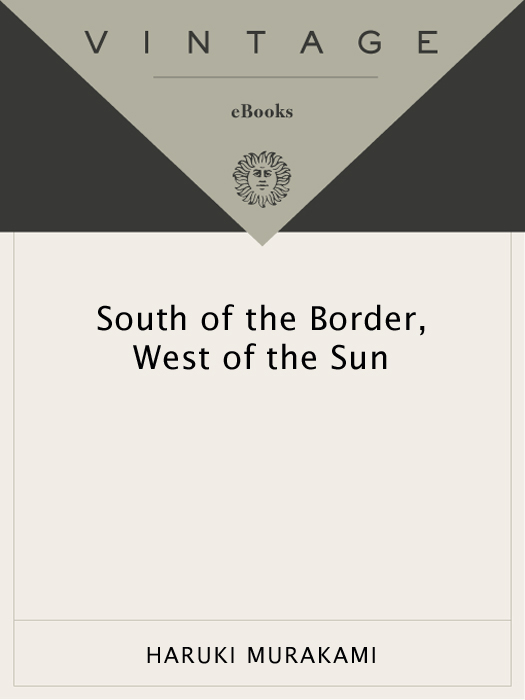
SOUTH OF THE BORDER, WEST OF THE SUN
His most deeply moving novel.
The Boston Globe
Mesmerizing. This is a harrowing, a disturbing, a hauntingly brilliant tale.
The Baltimore Sun
A fine, almost delicate book about what is unfathomable about us.
The Philadelphia Inquirer
Portrayed in a fluid language that veers from the vernacular to the surprisingly poetic.
San Francisco Examiner & Chronicle
Haunting and natural. South of the Border, West of the Sun so smoothly shifts the reader from mundane concerns into latent madness as to challenge ones faith in the material world contains passages that are among his finest.
The New York Observer
Haruki Murakami applies his patented Japanese magic realismminimalist, smooth, and transcendently oddto a charming tale of childhood love lost
New York
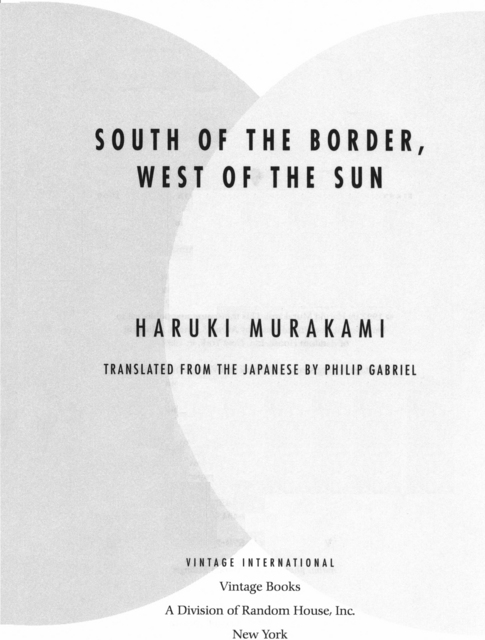
My birthdays the fourth of January, 1951. The first week of the first month of the first year of the second half of the twentieth century. Something to commemorate, I guess, which is why my parents named me Hajime Beginning, in Japanese. Other than that, a 100 percent average birth. My father worked in a large brokerage firm, my mother was a typical housewife. During the war, my father was drafted as a student and sent to fight in Singapore; after the surrender he spent some time in a POW camp. My mothers house was burned down in a B-29 raid during the final year of the war. Their generation suffered most during the long war.
When I was born, though, youd never have known thered been a war. No more burned-out ruins, no more occupation army. We lived in a small, quiet town, in a house my fathers company provided. The house was prewar, somewhat old but roomy enough. Pine trees grew in the garden, and we even had a small pond and some stone lanterns.
The town I grew up in was your typical middle-class suburbia. The classmates I was friendly with all lived in neat little row houses; some might have been a bit larger than mine, but you could count on them all having similar entranceways, pine trees in the garden. The works. My friends fathers were employed in companies or else were professionals of some sort. Hardly anyones mother worked. And most everyone had a cat or a dog. No one I knew lived in an apartment or a condo. Later on I moved to another part of town, but it was pretty much identical. The upshot of this is that until I moved to Tokyo to go to college, I was convinced everyone in the whole world lived in a single-family home with a garden and a pet and commuted to work decked out in a suit. I couldnt for the life of me imagine a different lifestyle.
In the world I grew up in, a typical family had two or three children. My childhood friends were all members of such stereotypical families. If not two kids in the family, then three; if not three, then two. Families with six or seven kids were few and far between, but even more unusual were families with only one child.
I happened to be one of the unusual ones, since I was an only child. I had an inferiority complex about it, as if there was something different about me, that what other people all had and took for granted I lacked
I detested the term only child. Every time I heard it I felt something was missing from melike I wasnt quite a complete human being. The phrase only child stood there, pointing an accusatory finger at me. Somethings not quite all there, pal, it told me.
In the world I lived in, it was an accepted idea that only children were spoiled by their parents, weak, and self-centered. This was a givenlike the fact that the barometer goes down the higher up you go and the fact that cows give milk. Thats why I hated it whenever someone asked me how many brothers and sisters I had. Just let them hear I didnt have any, and instinctively they thought: An only child, eh? Spoiled, weak, and self-centered, I betcha. That kind of knee-jerk reaction depressed me, and hurt But what really depressed and hurt me was something else: the fact that everything they thought about me was true. I really was spoiled, weak, and self-centered.
In the six years I went to elementary school, I met just one other only child. So I remember her (yes, it was a girl) very well. I got to know her well, and we talked about all sorts of things. We understood each other. You could even say I loved her.
Her last name was Shimamoto. Soon after she was born, she came down with polio, which made her drag her left leg. On top of that, shed transferred to our school at the end of fifth grade. Compared to me, then, she had a terrible load of psychological baggage to struggle with. This baggage, though, only made her a tougher, more self-possessed only child than I could ever have been. She never whined or complained, never gave any indication of the annoyance she must have felt at times. No matter what happened, shed manage a smile. The worse things got, in fact, the broader her smile became. I loved her smile. It soothed me, encouraged me. Itll be all right, her smile told me. Just hang in there, and everything will turn out okay. Years later, whenever I thought of her, it was her smile that came to mind first.
Shimamoto always got good grades and was kind to everyone. People respected her. We were both only children, but in this sense she and I were different. This doesnt mean, though, that all our classmates liked her. No one teased her or made fun of her, but except for me, she had no real friends.
She was probably too cool, too self-possessed. Some of our classmates must have thought her cold and haughty. But I detected something elsesomething warm and fragile just below the surface. Something very much like a child playing hide-and-seek, hidden deep within her, yet hoping to be found.
Because her father was transferred a lot, Shimamoto had attended quite a few schools. I cant recall what her father did. Once, she explained to me in detail what he did, but as with most kids, it went in one ear and out the other. I seem to recall some professional job connected with a bank or tax office or something. She lived in company housing, but the house was larger than normal, a Western-style house with a low solid stone wall surrounding it. Above the wall was an evergreen hedge, and through gaps in the hedge you could catch a glimpse of a garden with a lawn.
Shimamoto was a large girl, about as tall as I was, with striking features. I was certain that in a few years she would be gorgeous. But when I first met her, she hadnt developed an outer look to match her inner qualities. Something about her was unbalanced, and not many people felt she was much to look at. There was an adult part of her and a part that was still a childand they were out of sync. And this out-of-sync quality made people uneasy.
Probably because our houses were so close, literally a stones throw from each other, the first month after she came to our school she was assigned to the seat next to mine. I brought her up to speed on what texts shed need, what the weekly tests were like, how much wed covered in each book, how the cleaning and the dishing-out-lunch assignments were handled. Our schools policy was for the child who lived nearest any transfer student to help him or her out; my teacher took me aside to let me know that he expected me to take special care of Shimamoto, with her lame leg.
Font size:
Interval:
Bookmark:
Similar books «South of the Border, West of the Sun: A Novel»
Look at similar books to South of the Border, West of the Sun: A Novel. We have selected literature similar in name and meaning in the hope of providing readers with more options to find new, interesting, not yet read works.
Discussion, reviews of the book South of the Border, West of the Sun: A Novel and just readers' own opinions. Leave your comments, write what you think about the work, its meaning or the main characters. Specify what exactly you liked and what you didn't like, and why you think so.


